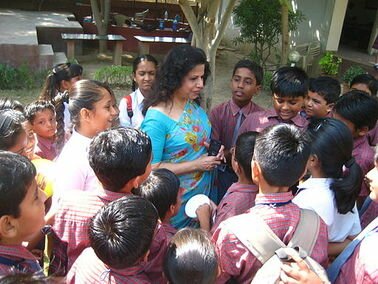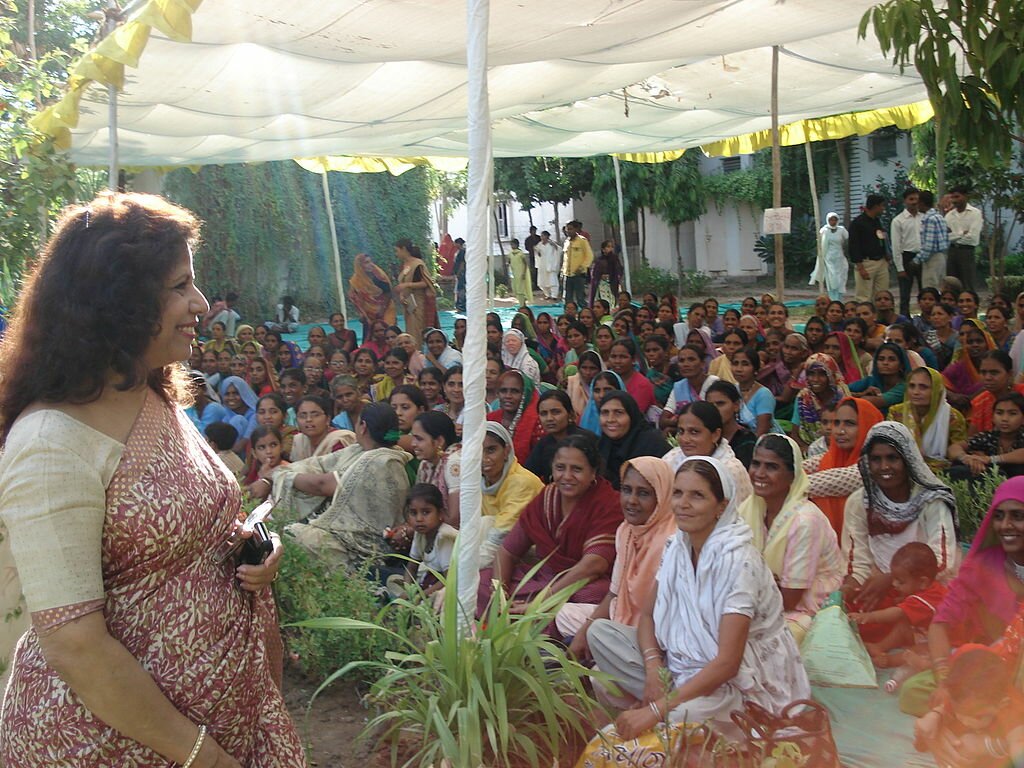|
Woman Entrepreneurs in Developing Nations is a whole systems perspective on the value of investing in development programs for education, skills training, social network relationship and investment to support the growth and success of women entrepreneur micro-enterprise.
Photo left: Hina Shah with Satyameva Jayate Students. By Icecd (Own work) [CC BY-SA 3.0 (http://creativecommons.org/licenses/by-sa/3.0)], via Wikimedia Commons.
|
Even though the percentage of women in the South Asian region is less then 13%, many women are engaged in petty or micro level businesses to support themselves and their families. (GEM Report 2014) Yet, micro level businesses are not considered viable and hence it is necessary that women are given the handholding to rather become entrepreneurs.
In addition and cutting across the globe, the most chronic problems identified by researchers are women's lack of confidence and difficulties in acquisition of entrepreneurial skills (Shah, 1996). Another area of concern is the issue of economic sustainability of women led microenterprises. In the specific context of enhancing the economic position of women, microenterprises can be taken to refer income-generating projects that women undertake to advance their own and their families’ economic well-being.. For rural women living in poverty in India and south Asia in general, the situation is even grimmer, because it is often exacerbated by exploitation. Because of family responsibilities, certain social customs, values and practices in some societies, and because of male dominance, women in India often lack exposure to the outside world. Forced to work within a restricted ecosystem, ,aspiring women entrepreneurs living in rural areas become dependent on middlemen and other agencies, especially if markets are beyond their reach.
Although regional variations should caution us against making general statements about microenterprises and entrepreneur development for women in the region, they should not distract us from discerning common problems faced by the majority of them. These women operate in adverse conditions and overcoming these adversities is of utmost importance as it strikes at the very root of their livelihood. For them, and indeed other disadvantaged women like them, the problems besetting their microenterprises should be given greater attention. Some of the key factors we identified as obstacles in setting up a microenterprise in India specifically and South Asia generally:
- production technologies and skills;
- financial resources;
- marketing and product development and
- management
|
Hina Shah has been an entrepreneur since 1978 in the field of plastic packaging. She is currently Director of the International Centre for Entrepreneurship and Career Development (ICECD) in Ahmedabad, India. In 1986, she has transformed her own entrepreneurial experience into this developmental initiative, which has facilitated thousands of disadvantaged youth, with a special focus on women, in becoming entrepreneurs in India and around the world. Hina Shah on Wikipedia.
|
|
Punit Saurabh is senior faculty member at International Centre for Entrepreneurship and Career Development (ICECD) in Ahmedabad, India. His research interests include innovation management and Entrepreneurship development, and he has varied experience in product funding and commercialization. His interests also include international affairs, healthcare, and women entrepreneurship. Follow Punit on Twitter
|
Citation: Shah, H., & Saurabh, P. 2015. Women Entrepreneurs in Developing Nations: Growth and Replication Strategies and Their Impact on Poverty Alleviation. Technology Innovation Management Review, 5(8): 34–43. http://timreview.ca/article/921
Ensure education, economic and workforce services for a community of outstanding developers. Send a donation to I-Open by clicking on the donate button below. Every dollar is appreciated!








 RSS Feed
RSS Feed